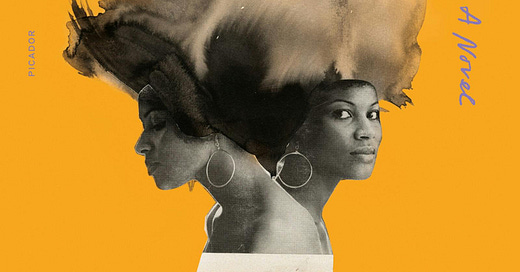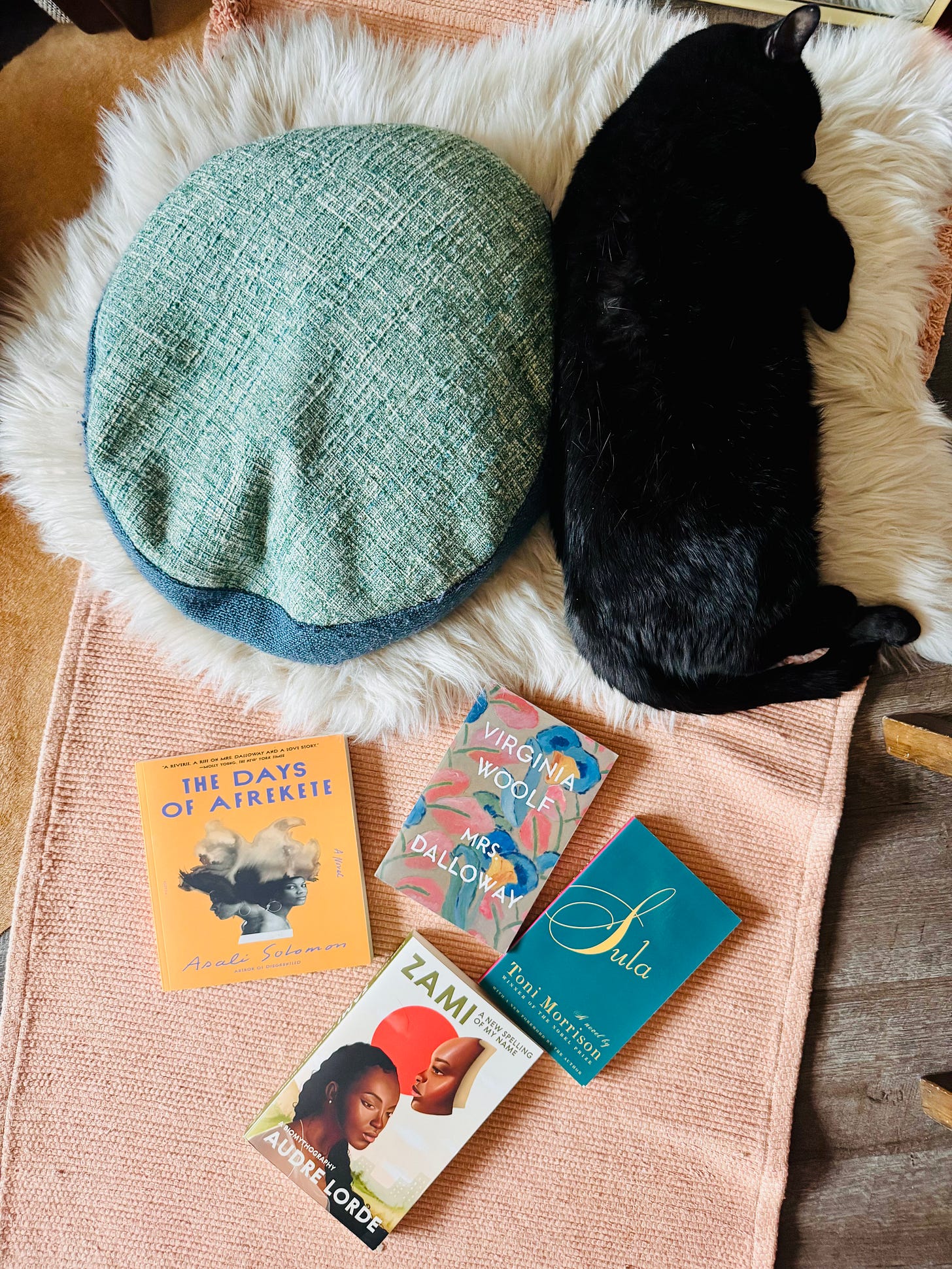Supplemental Reading - March 2025
Our supplemental reading(+) recommendations for March's Dear Readers selection, The Days of Afrekete by Asali Solomon
A quick note from Cassie and Stevie:
Our “Supplemental Reading” is a way for our discourse on each month’s book to continue. We’ll be recommending other books that you may like if you liked the month’s pick; related books or articles by the author (or others); the source text that may have inspired the author; and movies, articles, and other media that feel appropriate to consume in light of the topic at hand. None of these lists are intended to be fully comprehensive, so please give us your suggestions as well.
Happy Women’s History Month, and happy reading, Dear Readers!
xo, C+S
Our March 2025 book club pick: The Days of Afrekete by Asali Solomon, a loose kind of retelling drawing from three classics—Mrs. Dalloway by Virginia Woolf, Sula by Toni Morrison, and Zami: A New Spelling of My Name: A Biomythography by Audre Lorde.
Cassie’s note on The Days of Afrekete by Asali Solomon:
This lovely novel shares the same structure and bones as Mrs. Dalloway—a day in the life in which a dinner party at the main character’s home is set to occur. In both books, we are given insight into Liselle’s (in Days) and Mrs. Dalloway’s stream-of-consciousness—Virginia Woolf was an early adopter of this literary device, which was experimental at the time (though somewhat ubiquitous today).1 Solomon does an incredible job of capturing her main character’s ephemeral state of being physically in one place—a dinner party she is hosting—with her mind elsewhere, i.e., nostalgic flashbacks, triggered memories, etc. Pulling inspiration from Sula and Zami, Solomon layers even more class and race conversations to the narrative, making the novel a gorgeous modern retelling of Mrs. Dalloway.
If you want more of Asali Solomon (we certainly do):
Her first novel, Disgruntled, and her short stories, Get Down. Our first foray into short stories as a book club is happening in April, so we’re especially motivated to explore more collections.
This episode of the fiction/non/fiction podcast. Asali Solomon is the guest on this episode, but Stevie also thought this was just a fascinating concept for a podcast—current events interpreted through the lens of literature. fiction/non/fiction features conversations with writers of all stripes, from novelists and poets to journalists and essayists.
This episode of the So Many Damn Books podcast. Sara Nović, author of True Biz (which was on our syllabus in 2023 and remains a book club favorite to this day), is the guest, and she brings along a book she’s just read that is—you guessed it—The Days of Afrekete.
If you want a Virginia Woolf (1882-1949) primer and then a deeper dive:2
Mrs. Dalloway is a great place to start, not only because it is the primary source text for this month’s retelling, but also because it’s her most accessible work.
A Room of One’s Own is Woolf’s most well-known piece of work and has recently been re-published with an introduction by Lauren Groff. It’s a nonfiction, novella-length essay that explores the financial and societal constraints placed upon women which necessarily limit a woman’s ability to pursue a writing practice. A classic manifesto for creatives, her assertion that women need both financial independence and a space of their own to write freely is still salient today.
To the Lighthouse is Cassie’s personal favorite of Woolf’s bibliography. This work is a masterpiece of language—the style, the lyricism, the exploration of human nature is all gorgeously done. This book follows multiple characters of a family over the course of a decade as they visit the Isle of Skye in Scotland.
Take the Virginia Woolf obsession one step further with two incredible deep cuts: Orlando (confronts gender norms and roles through the story of an Elizabethan nobleman who, in his mid-30s, wakes up to find that he’s a woman and lives another 300 years; Orlando is said to be the ‘fictional embodiment of Woolf's close friend and lover, Vita Sackville-West’) and The Waves (follows six characters as they mourn and grieve the loss of a friend; if you like Sally Rooney, this feels like an English grandmother to some of her work).
The Diary of Virginia Woolf, Volume 1. For an even deeper dive into the psyche of a truly genius writer.
Love Letters: Vita and Virginia. A collection of the correspondence between Virginia Woolf and her lover and fellow writer Vita Sackville-West. Their relationship has been the subject of many books, films, stories, and for good reason. Here’s a Time article worth your time. Allison Bechdel wrote a piece for The Guardian calling the letters “masterpieces of longing,” which Cassie wholeheartedly agrees with.
If you want an Audre Lorde (1934-1992; self-described “Black, lesbian, mother, warrior, poet”) primer and then deeper dive:
Zami: A New Spelling of My Name: A Biomythography is where we recommend you start, not only because it’s one of the texts that inspired this month’s read but because this is a "biomythography" of Lorde. Published in 1982, this Audre-coined genre blends autobiography, mythology, and history, and similar to Days, often takes us places other than the present, as Audre explores her sexuality and the women she met along the way.
The Selected Works of Audre Lorde, published in 2000, provides the essentials of one of the first voices to center the experiences of Black, queer women. This collection features both poetry and prose, including much of her best-known work, such as her poetry collection The Black Unicorn and selections from Sister Outsider.
If you want a Toni Morrison (1931-2019) primer and then deeper dive:
Toni Morrison is one of the greatest writers in American history, and for good reason. Her work is powerful, her use of language is unmatched, and she is an elite storyteller. Every book is its own world—nuanced and heart-wrenching. It’s no wonder that she has won a Pulitzer Prize (for Beloved) and the Nobel Prize in Literature (1993).
The New York Times has a great article on “The Essential Toni Morrison,” which is a great place to start.
Sula is one of the source texts/inspirations for The Days of Afrekete and is a story of female friendship following two Black girls from childhood in Ohio to adulthood. This book was listed as one of The Atlantic’s Great American Novels of the Past 100 Years.
The Bluest Eye is Morrison’s debut novel and an important character study of a young Black girl as she comes of age, grappling with whiteness, beauty, and how they intersect with her identity. The language is incredibly powerful and Morrison’s writing is gorgeous. This novel will wreck you in the best way. (This is Cassie’s favorite of the Toni Morrison books she’s read thus far.)
Beloved is arguably Morrison’s most important work, set in pre-Civil War times, primarily in Cincinnati, Ohio. The film adaptation stars Oprah. Morrison won the Pulitzer for this book.
Jazz is a love story with a love triangle set in the 1920s. The novel also explores Harlem’s jazz generation. (This one is high on Cassie’s TBR—she snagged a first edition of this book from her local little free library last year and is jazzed to read it.)
If you want more contemporary stories involving political aspirations, old flames, racial tensions, or some combination of these topics, consider checking out these novels (the first two were recommended by our a couple of our Dear Readers).
How to Sleep at Night by Elizabeth Harris
Such a Fun Age by Kiley Reid
The Vanishing Half by Brit Bennett
An American Marriage by Tayari Jones
Once again, if you’re excited about all of the above and now have an even larger TBR, but at this moment, you just want a some poetry to carry with you into your day, we leave you with this:
Coal
By Audre Lorde
I Is the total black, being spoken From the earth's inside. There are many kinds of open. How a diamond comes into a knot of flame How a sound comes into a word, coloured By who pays what for speaking. Some words are open Like a diamond on glass windows Singing out within the crash of passing sun Then there are words like stapled wagers In a perforated book—buy and sign and tear apart— And come whatever wills all chances The stub remains An ill-pulled tooth with a ragged edge. Some words live in my throat Breeding like adders. Others know sun Seeking like gypsies over my tongue To explode through my lips Like young sparrows bursting from shell. Some words Bedevil me. Love is a word another kind of open— As a diamond comes into a knot of flame I am black because I come from the earth's inside Take my word for jewel in your open light.
Want to get into the nerdy weeds on stream-of-consciousness writing in the early 20th century? Start with this article, and then read Ulysses by James Joyce, should you be so bold.
Cassie took a semester-long senior seminar on Virginia Woolf when she was an English lit major in college. This was her first introduction to Woolf, not having read her in high school, but since this class, Cassie has been a Virginia Woolf super-fan, which is why this list is so comprehensive.







